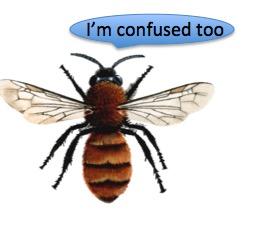Glyphosate, presently the world's most hated chemical, has been blamed for just about every ailment in humans and animals. EcoWatch, a group not widely known for accurate reporting, makes 15 ridiculous claims about the herbicide. Now we have another one - disruption of the biome in the gut of bees.
Erick Motta and colleagues at The University of Texas in Austin just published a paper in PNAS entitled "Glyphosate perturbs the gut microbiota of honey bees." in which they claim that the herbicide is harming bees:
Understanding how glyphosate impacts bee gut symbionts and bee health will help elucidate a possible role of this chemical in colony decline.
Erick Motta, et. at.
The paper is long, detailed, and contains five rather complex figures. It is not easy to follow. Rather than evaluate the biology, I picked out some questionable data, explanations, and conclusions. If the study behind the paper is flawed then it doesn't matter how complex or sophisticated the biology is. Here are some fairly obvious problems:
- Glyphosate dose
"Hundreds of adult worker bees were collected from a single hive, treated with either 5 mg/L glyphosate (G-5), 10 mg/L glyphosate (G-10) or [control] for 5 d, and returned to their original hive... Glyphosate concentrations were chosen to mimic environmental levels, which typically range between 1.4 and 7.6 mg/L, and may be encountered by bees foraging at flowering weeds."
Whoa. Here is an assumption that puzzles me. What does a dose of 5-10 mg have to do with the amount of glyphosate that would be found in, or consumed by, a bee foraging in weeds that contain a similar concentration? What is the relevance of this dose to real life? How much glyphosate is found in a bee that has not been fed glyphosate?
2. Lack of dose response
"The effects of glyphosate exposure on the bee gut microbiome were more prominent at day 3, after treated bees were returned to the hive. The total number of gut bacteria decreased for both treatment groups, relative to control, but this drop was significant only for the G-5 group, which also exhibited more severe compositional shifts."
When lower doses of a chemical or drug produce more of an effect than higher doses, this is a screaming red flag. While the authors speculate that "The relative lack of effects of the G-10 treatment on the microbiota composition at day 3 posttreatment is unexplained, but may reflect other effects of glyphosate on bees," a more credible explanation is that there is nothing real going on, just statistical wobble.
3. Confounders
"Since fewer than 20% of bees reintroduced to the hive were recovered, recovered bees may not represent the total effect of glyphosate on treatment groups."
Anytime you see a study where data is collected on less than 20% of the participants the chance of that study being valid is much lower. The authors state that "hundreds of adult worker bees were collected from a single hive." Let's call it 300. These were divided into one control and two glyphosate-treated group, which would then contain 100 bees each, so we can estimate that about 20 bees from each group returned. When n = 20 any conclusions from data are usually suspect.
Not only are the data points cut by 80%, leading to less reliable statistics, but the possibility of reporting bias shoots up. Is there something going on in the 80% of the bees that didn't return that is leading to spurious conclusions about the 20% that did?
4. Did anything really happen?
"Assessment of gut microbiomes, as described in the previous section, identified all eight core gut taxa in both control and treatment groups (Fig. 2A), showing that glyphosate does not eliminate colonization by any core member. Average total bacterial abundance was slightly lower in glyphosate-treated bees, but this was not statistically significant (Fig. 2B)."
Although the relative composition of the bee gut biome may have changed, none of the eight bacteria measured was eliminated. And there was no difference in the total number of bacteria in either the high-dose, low-dose, or placebo groups. So, glyphosate supposedly altered the bacterial composition found in the gut of bees but did not affect the total number of bacteria nor did it kill any of the eight strains that were measured.
5. Bottom line
There are so many flaws in this study that it doesn't even begin to address whether changes in the biome are playing any part in bee health or that glyphosate is responsible for anything at all.
This study should be returned to the hive.




